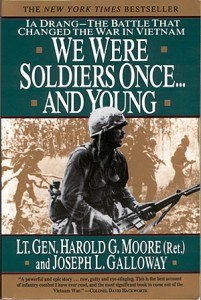Blaze of Glory
Rick Rescorla is a supreme example of a man who consciously embraced his kairos moment when it finally came to him.
An Englishman by birth, Rescorla died a true American hero.
An account of his actions during the Sept.11, 2001, attacks on New York’s Trade Center towers can be found discreetly tucked into the appendix section of the 2008 book We Are Soldiers Still. The book’s author, Lt. Gen. Harold G. Moore—a legendary Army commander who led ground troops during the famed Battle of Ia Drang Valley, the opening salvo of the Vietnam War—gives an account of the last few moments in the life of his friend Rescorla, an infantry officer who had served under him in the battle.
An iconic photograph of a ruggedly posed Rescorla, M16 in hand, snapped in the heat of the 1965 battle, graces the cover of Moore’s other book, the 1992 best-seller We Were Soldiers Once…and Young, later adapted into a Hollywood film starring Mel Gibson.
Despite finding professional success, Rescorla experienced personal tragedy in the few years prior to the September 11 attacks. Divorced and remarried, with two children, he had been diagnosed with prostate cancer in 1994.
As Moore tells it,
He had written and spoken to close friends about his fears of retirement in a year or two and how it appeared that his life would end without the kind of great and meaningful cosmic event summed up in the Greek word kairos. “I have accepted the fact that there will never be a kairos moment for me,” Rescorla wrote in an e-mail to his old battle buddy, battalion surgeon Dr. William Shucart, six days before 9/11. “Just an uneventful Miltonian plow-the-fields discipline…a few more cups of mocha grande at Starbucks, each one losing a little bit more of its flavors.” To another friend Rescorla grumbled, “God, look at us. We should have died performing some great deed—go out in a blaze of glory, not end up with someone spoon-feeding us and changing our nappies.” (1)
A few days later, Rescorla got a shot at his great wish.
At 8:46 a.m. on Sept. 11, 2001, when terrorists flew a commercial airliner into the top floors of the tower across from his 44th floor office in Building Two of the World Trade Center, Rescorla sprang into action.
Rescorla grabbed a bullhorn and began evacuating the 2,700 people under his care spread out across 20 floors and a separate office building on the tower complex.
At 9:03 a.m., when terrorists flew a second hijacked airliner into Building Two, Rescorla had already escorted most of Morgan Stanley’s employees out of the building while the rest were escaping down the stairwells.
When the building finally collapsed only thirteen Morgan Stanley employees, the 62-year-old Rescorla among them, were killed alongside the nearly three thousand other victims of the World Trade Center attacks.
Afterwards, no trace of Rescorla’s body was ever found among the smoking debris of the shattered steel skyscrapers. He had left this life just as he had wished to go: “in a blaze of glory.”
The ancient Greeks would have recognized Rescorla’s simple, yet profound, brand of heroism.
The “great and meaningful cosmic event” he had so longed for had been named by them thousands of years earlier.
They had sorted through the actions of their own great heroes, studied the flaming arcs of fate, fame, and fortune, and discovered the one turning wheel that made them all come together.
They had distilled it and named it.
It was kairos.
To them, it was the moment in time where the gods met with mortals.
Even today, as Rescorla’s story shows us, it is still a moment where men and women can open a door to fate and reveal an amazing purpose for their lives—and make history.
(1) Lt. Gen. Harold G. Moore and Joseph L. Galloway, We Are Soldiers Still: A Journey Back to the Battlefields of Vietnam, (New York: HarperCollins Publishers, 2008), 211.
Recommended additional reading: Stewart, James B. Heart of a Soldier. New York: Simon & Schuster, 2002.

